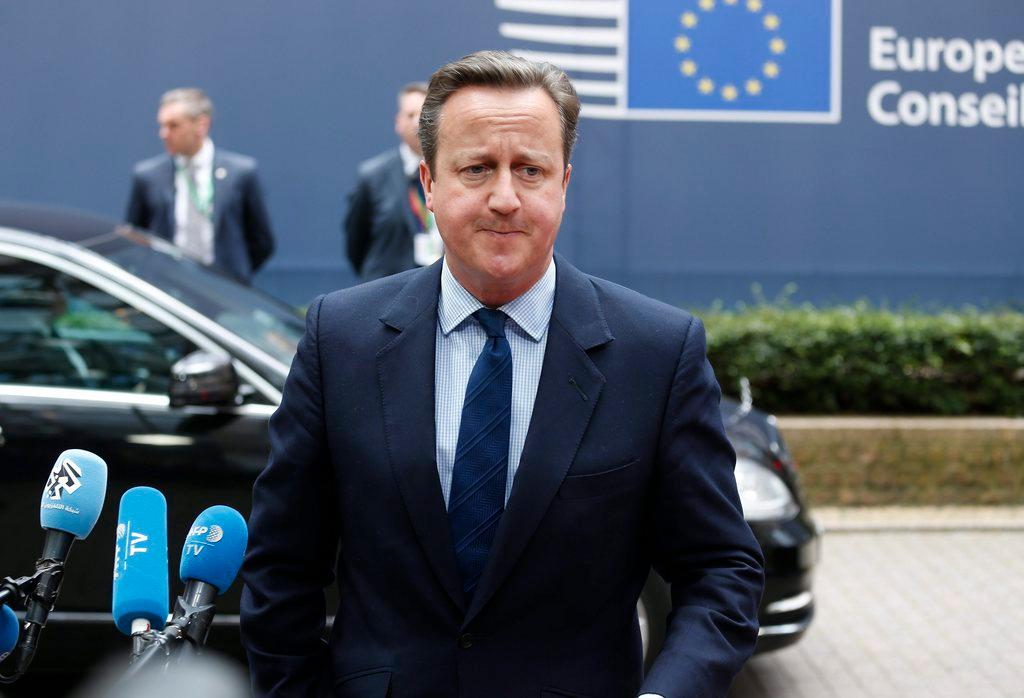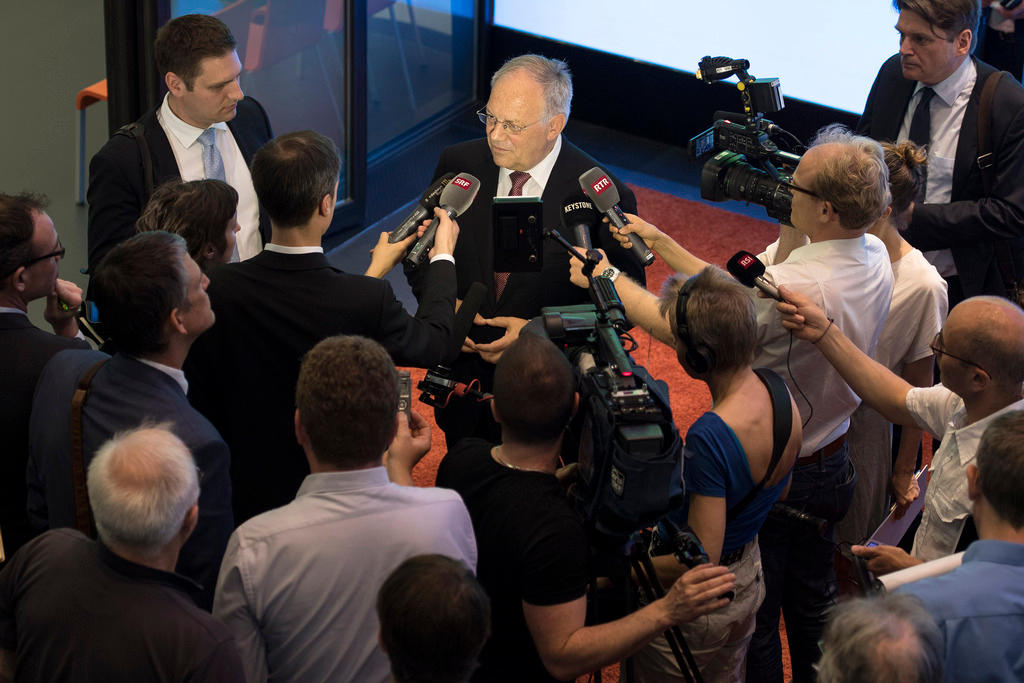Swiss role in flux

Two years after the country voted to curb immigration from the EU, it is desperate to reach a deal with Brussels. But few in Europe want to strike a pact that could be a template for post-Brexit Britain.
The Swiss president was on an urgent mission to Mongolia. Outside a yurt a 15-minute drive from Ulan Bator, Johann Schneider-Ammann finally managed to grab some time with the person he had travelled so far to see.
The yurt-side huddle in July was not about peacemaking between warring nations – the sort of negotiations for which neutral Swiss diplomats are famous. Instead Mr Schneider-Ammann was frantically trying to secure progress on a crucial matter for Switzerland’s economy, and potentially for Britain’s exit from the EU. His small Alpine state, surrounded by the EU but not part of it, had inadvertently become a test bed for how the bloc stands up to demands for special treatment from immigration-wary neighbours.

More
Financial Times
External linkThe man Mr Schneider-Ammann had flown halfway around the world to see was Jean-Claude Juncker, president of the European Commission, who was in Mongolia for a Europe-Asia summit. The Swiss head of state badly needed Mr Juncker’s help.
In February 2014, the Swiss people had voted in a referendum in favour of limits and quotas on immigration – in direct violation of a Swiss-EU deal on the free movement of people.
In a scenario that architects of the Brexit campaign will appreciate, the Swiss were seeking to maintain existing trading relations while adding new controls on inflows of foreigners. The government had three years to implement the plan – and time was running out.
But Mr Juncker was reluctant to oblige. Less than a month earlier, the UK had voted to leave the EU. Before, the wily Luxembourger might have cut a deal, but Brexit had changed the dynamics.
“Since the Swiss president came all the way to Mongolia we said fine, you can have ten minutes,” says one Brussels diplomat. “And Juncker told him it would be very difficult to find a solution.” (Swiss officials say the meeting lasted more than 45 minutes.)
Switzerland has long been an oddity in Europe. It is not in the EU but contributes to its budget, replicates many of its rules and enjoys many of the benefits of membership. But the Brexit vote has made its relationship more complex. With tricky divorce negotiations looming with London, Brussels could not be seen as a soft touch with a demanding non-member.
How the stand-off is eventually resolved could have important implications for Switzerland. But it could also set a precedent for talks with the UK. If Switzerland secured agreement on measures that could limit inflows of workers from other EU countries, a similar model could be applied to the UK.
“It is exactly the same trade-off as in the UK – between an organised relationship with the EU and some kind of limit on immigration,” says Alexis Lautenberg, former Swiss ambassador to the UK. “Switzerland is perhaps two-and-a-half years ahead.”
Mr Juncker and Mr Schneider-Ammann are set to meet again on Monday, this time in Zurich. The Swiss hope for more progress. But there is little sign so far that EU will take a softer line. If anything, their negotiating stance has hardened, calling into question the future of Switzerland’s unique web of bilateral agreements with the EU.
“Why should it always be Europeans who have to find solutions to problems that others have created?” said Manfred Weber, the German leader of the centre-right bloc in the European Parliament. “I’m not ready to negotiate and talk and renegotiate. Swiss politicians have to go to the public and explain the outcome and consequences of the referendum. Brexiteers … should do the same.”
Brussels’ mood toughens
The quirkiness of Switzerland’s relationship with the EU lies in its history and politics. Surrounded by larger neighbours, the mountainous country has long rejected outside influence. The Swiss constitution gives ultimate sovereignty to its people – laws are challenged and new clauses approved in binding referendums – which many Swiss argue is incompatible with surrendering powers to the EU.
In 1992, the Swiss rejected membership of the European Economic Area after a campaign led by Christoph Blocher, the billionaire businessman, and his ultra-conservative Swiss People’s Party (SVP), which is today the country’s most popular political movement. Instead, over the decades, Switzerland has agreed a web of more than 120 bilateral contracts governing economic and trading relations.
At first, Switzerland remained formally committed to eventual EU membership. As that aspiration fizzled, however, Brussels applied pressure on Switzerland to put its relationship with the EU on a more formal basis via an “institutional framework”, which would involve Swiss laws changing automatically as EU rules evolved. It would also require Switzerland to follow the rulings of the European Court of Justice.
The existing, ad hoc relationship has not stopped Switzerland becoming a highly successful economy – its population is one of the wealthiest in the world – and an attractive place to work.
The Swiss argue it is a mutually beneficial relationship. While Swiss banks have attracted bad publicity over the past decade for the help they gave clients to evade taxes, the country’s wealth is based on highly successful multinationals like Nestlé and Novartis.
Attractive place
Like the UK, Switzerland is a trading nation. Historically, the Swiss have leveraged its role as a route between northern and southern Europe. A threat to blow up mountain tunnels is cited as a reason it was not invaded by Germany during the Second World War. More recently, Mr Blocher has suggested blocking access to the new 57km rail tunnel under the Gotthard mountain – the longest in the world – if its dispute with Brussels escalates.
In 2015, Switzerland’s two million foreigners with permanent residency comprised almost a quarter of the country’s population of 8.3 million, compared with 19.3% among a population of 7.1 million 20 years earlier. Each day, about 308,000 EU nationals from Germany, France, Italy and Austria and other countries commute across the border to work in the country, according to the Federal Statistical Office.
But the unease among voters about Switzerland’s population growth and perceived threats to local jobs led to the narrow vote in favour of immigration quotas in 2014. The vote threw the Bern government into confusion. Its strict implementation would clearly violate the principle of the free movement of people enshrined into its bilateral deals. Talks on expanding the contracts – including a deal on financial services – were put on hold.
“How do I say this diplomatically – the Swiss are in an impossible situation,” says the senior EU diplomat.
Michael Ambühl, a former Swiss negotiator who is a professor at Zurich’s Federal Institute of Technology, says: “The fact that after more than two years we still have no solution shows how difficult the implementation is.”
Swiss politicians have proposed squaring the circle by adopting a “safeguard clause”, or emergency brake, on immigration in exceptional circumstances. But David Cameron, the former UK prime minister, won few concessions on migration before Britain’s referendum, and the vote to leave the EU made it almost impossible to take a more generous stance with Switzerland.
Using Brussels negotiating jargon, the EU diplomat says: “In a positive scenario [a UK vote to stay in the EU] you would have got Cameron minus minus, now you can get Cameron minus minus minus minus minus. We cannot create anything that would set a precedent.”
“If we give them any emergency brake or anything like that, while having access to the single market and [the financial services] passport, you create a precedent that you do not want,” the diplomat adds. “So I don’t see that happening. It cannot happen.”
It is possible that Switzerland largely caves in and claims to abide by the free movement of people. Earlier this month, a parliament commission in Bern proposed a system to encourage employment of domestic workers before foreigners, for instance by obliging companies to report vacancies at local jobcentres. There would be no limits set without explicit EU approval.
The more modest proposals received broad backing from Swiss political parties, with the notable exception of the Swiss People’s Party, highlighting widespread fears of violating the bilateral contracts.
The main risk, though, is another popular revolt by the Swiss people at the polls. What is more, even if an immediate confrontation was avoided, the EU may still not be satisfied. In its talks with Bern, Brussels has raised concern about potential discrimination. And it has insisted that free movement has to be discussed at the same time as the idea of a formal “institutional framework” between Switzerland and the EU.
That prospect horrifies Swiss politicians. Any deal would almost certainly be subject to a referendum which highlights two highly sensitive issues – immigration and rule by “foreign judges” in the European court. The risk of the Swiss people throwing out the whole package would be considerable.
A lot rides on how the Brexit negotiations unfold. Not all the implications are negative for the Swiss. They have one trump card: until it formally leaves the union, Britain has a veto on any move to “guillotine” bilateral trading ties with the Swiss. London will hardly support punishing a country asking for curbs on free movement. But there are other forms of potential retaliation, such as freezing Swiss academics out of EU-funded research projects.
New European model
More positively, Swiss commentators see opportunities as the EU rethinks its relations with neighbours, with models of associate membership or privileged partnerships. “I think Brexit will be a catalyst for new thinking in Brussels,” says Professor Ambühl. “Even if you don’t like the results, referendums can sometimes be a creative force.”
National governments might also be more conciliatory than Brussels. For example, Germany has tended to be more accommodating towards the Swiss because its economic interests are significant in border regions such as Baden-Württemberg.
But even Berlin realises the precedents for Brexit could be significant. The commission’s longstanding gripes about the Swiss being outside the EU’s institutional reach have suddenly garnered more sympathy. Across the EU, Switzerland is seen as having benefited in the past from an enviable network of specially tailored contracts; there is a sense that they will be wary of offering Britain something similar.
“You don’t make a mistake like that twice,” says one former EU negotiator.
Britain and Switzerland share both a reflexive distrust of pooling sovereignty for the supposed common good, and an interest in a fair, productive settlement with the EU. A Swiss deal will be a benchmark for London. Brexit “makes things more complicated for Switzerland in the short term, but it may lead to more convergence with the UK in the long term”, says Mr Lautenberg.
As he speaks today in Zurich, it will not be hard for Mr Juncker to appreciate the Anglo-Swiss connections: he is, after all, delivering “the Churchill Lecture”.
Christoph Blocher: Bullish People’s party leader wants better deal
Christoph Blocher, the leader of the ultra-conservative Swiss People’s Party (SVP), has dominated the Swiss debate over the EU since the early 1990s. In October last year, the SVP won almost 30% of the vote in parliamentary elections, making it Switzerland’s biggest party.
In its strident defence of traditional Swiss values and EU scepticism, the SVP was a forerunner of nationalist parties that have grown in influence across Europe. Last year, Mr Blocher, a wealthy businessman, told the Financial Times that he saw parallels between himself and Donald Trump, the Republican presidential hopeful in the US. “Like Trump, I have an advantage. I’m an industrialist; I’m independent,” he said.
There is also a similarity with Jean-Marie Le Pen, the veteran French nationalist. Both have daughters who have followed them into politics: Marine Le Pen is running for French president as leader of the National Front next year; Magdalena Martullo-Blocher is a prominent Swiss parliamentarian.
Upsetting the consensus between other Swiss political and business leaders, Mr Blocher argues that Switzerland can stand up to its bigger EU neighbours. He would suffer personally if market access was lost: EMS Chemie, his family company where Ms Martullo-Blocher is chief executive, relies heavily on exports.
Mr Blocher, 75, sees a similarity between this year’s UK Brexit vote and the campaign he ran against Swiss membership of the European Economic Area in 1992. In Switzerland, there were predictions of economic disaster if the population voted against integration into Europe, he points out.
But opinion polls show that the Swiss worry about jeopardising the country’s bilateral contracts with the EU. The SVP’s support has also proved fragile this year. In February, Swiss voters decisively rejected tougher rules on expelling foreign criminals, which the party had hoped would win support on the back of anti-immigration sentiment in Europe.
Copyright The Financial Times Limited 2016

In compliance with the JTI standards
More: SWI swissinfo.ch certified by the Journalism Trust Initiative













You can find an overview of ongoing debates with our journalists here . Please join us!
If you want to start a conversation about a topic raised in this article or want to report factual errors, email us at english@swissinfo.ch.